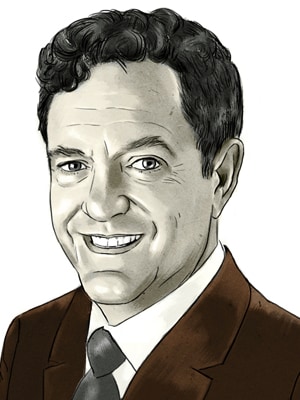
The Changing Men of Capitalism
Bad boys may often be popular, but capitalism is increasingly selecting for good behaviour
Does capitalism, in evolutionary terms, select for jerks or saints? The popular culture has always smiled at jerks. Generals George Patton and Douglas MacArthur are enduring symbols of American boldness and strength; nice guys Omar Bradley and George Marshall are not. Angry John Lennon seemed authentic; syrupy Paul McCartney not so much, even though he is a vastly superior musician. The bad boy of distance running, Steve Prefontaine, never set a world record or won an Olympic medal, but his legend endures. Who has the best food show on TV? The Chef from Hell, Gordon Ramsay. Which retired college basketball coach has a hot-selling book? The prince of jerks, Bob Knight.
Face it, jerks are more interesting. The source of their nastiness is often narcissism. They score perfect 10s on vanity, egotism, pride and haughtiness. The flip side is that they can be very charismatic. Susan Cain, author of the bestselling Quiet: The Power of Introverts in a World That Can’t Stop Talking, writes: “We watch people like Charlie Sheen BECAUSE they are narcissistic, not in spite of it. [Research has found] that the most narcissistic students tended to be better liked... the type of narcissism that was most predictive of popularity was the most malignant kind.”
How to spot a self-centered jerk- in-training? Cain writes, “They dress neatly and flashily, have charming facial expressions, have self-assured body language, are verbally witty and find interesting and colourful ways to introduce themselves.”
But narcissists score low on empathy. Their clutch move is manipulating others. The clever jerks tell lies we want to believe. Lance Armstrong said he never doped because he had recovered from cancer and would never inject stuff into his body. Bernie Madoff promised 1 percent per month, forever. We eat this stuff up. Then we wake up. We no longer see charmers, we see jerks.
What about steve jobs?
It’s not illegal to be a jerk. We know it can be an advantage in business—witness Steve Jobs. But as managers and investors, is it smart to back jerks? As an employee, is it wise to work for one? The answer isn’t clear cut. Boeing’s successful CEO, Jim McNerney Jr, is likely glad that he worked for loud-mouthed Jack Welch. We can, however, observe two trends about jerks that can help guide us.
One is watching the jerk’s own evolution. The example again is Steve Jobs. The Jobs from Apple’s founding in 1976 to his own ouster in 1985 was, by turns, brilliant and manipulative, far-seeing and emotional, a showman and a credit hog, a schmoozer and a ruthless backstabber. Apple’s board asked Jobs to leave in 1985. Oracle’s Larry Ellison says the Jobs boot was the dumbest board move in history. But Apple had no choice, as Jobs was by then self-destructive.
Jobs was so depressed after his sacking that his friends feared for him. But during his wilderness years, Jobs matured and became wise. He married and had children. He started a new computer firm, which struggled, ladled out humility and taught patience. Jobs made his first billion dollars by investing in the brilliance of others (Pixar). When he returned to Apple, Jobs was a different man. He sought emotional counsel from an Apple director and former football coach, Bill Campbell. Jobs learned how to keep his best employees with- out sabotaging them. He was famously intolerant of shoddy work. But anger was no longer as personal to him as it had been. Now it was about the work.
The second trend we can observe is that most innovative companies now are often the best places at which to work. Capitalism increasingly selects for good behaviour, not bad. More on this good news in a future column.
Rich Karlgaard is the publisher at Forbes
(This story appears in the 30 November, -0001 issue of Forbes India. To visit our Archives, click here.)






